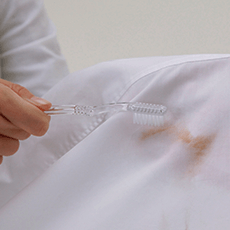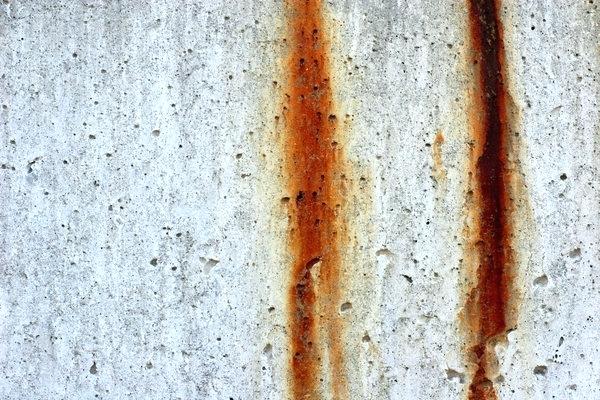One of the many services we offer is drain cleaning and repair to all of our clients in East York. When we carry out our service, we cannot help but notice the high amounts of rust some homes have. It is no problem for us to clean them up, but it is problem that can be avoided or easily clean up rather than being left alone. The thing with is rust is that is formed when iron, oxygen and water (moisture in the air) combine. The problem with rust is that it can get rubbed, dropped or scraped onto something else and create a stain. Here are some methods you can use to get rid of rust stains!
Clothing

One common method is the combination of lemon juice and salt for clothing. Lay out the garment and sprinkle salt onto the stained area, then squeeze fresh lemon juice onto the salt and allow the garment to dry in the sun. Note: For any garments suspected to fade or bleach when placed in harsh light, test on a seam or inconspicuous spot.
One teaspoon baking soda and one teaspoon of tartar with a few drops of hydrogen peroxide (typically used at home for first aid purposes) can be mixed together to create a paste. Spread it over the stain for 30 minutes before rinsing.
Putting clothes in the dryer or using chlorine bleach will set the stain, making it permanent. Do not put clothing in the dryer until the stain is removed! For dry clean only clothes, allow your professional cleaner to treat the stain as at-home methods may damage the fabric.
Carpet
If rusting is identified on carpet, immediately remove it. Do not put it back until all the rust is removed and the carpet is dry.
Use a dull knife to scrape away and loosen visible rust. With a vacuum, remove the loose rust. Mix two tablespoons of dishwashing soap with one tablespoon of household ammonia (used at home as a cleaner or repellent) in two cups of warm water. Dip a clean, white cloth into the mixture and wet the rusted area. Let this sit for five minutes before blotting it dry with a clean, dry rag. As the rust stain will be transferred from the carpet onto the rag, remember to move to a clean area of the rag often.
For remaining stains, mix ¼ cup table salt and one teaspoon lemon juice into a paste and let it sit on the stain for at least two hours. Blot this away with a damp, white towel and allow the carpet to air dry. Vacuum the carpet to lift the fibres. Repeat if needed.
Upholstery
The same mixtures and techniques as carpets can be used. Make sure the fabric isn’t soaked because excess moisture in the cushion or filling can cause problems. Silk or vintage upholstery will require the expertise of a professional upholstery cleaning company.
Furnishing
Soak a cloth in white vinegar and wring it out. Sprinkle the stain with salt and lay the soaked cloth on top. Leave for 30 minutes before checking the stain. If the stain still hasn’t disappeared, apply another vinegar-soaked cloth until the rust is removed.
Brick, Concrete, and Granite

Mix 7 parts lime-free glycerine, 1 part sodium citrate (available in drug stores), 6 parts lukewarm water and enough powdered calcium carbonate (chalk) to create a thick paste. Apply this paste to the stain and wait until it has hardened, then remove with a wooden scraper and wash the area thoroughly with clean water. Repeat if necessary.
Ceramic or Porcelain
Make a paste of borax and lemon juice to remove stains from ceramic tile, porcelain dishes and fixtures. Rub paste into the stain and allow it to dry. Wash with clean water and dry with a clean cloth. Rubbing a wet pumice bar onto the iron stain is also effective. Do not use the pumice stick on the ceramic glass as it will scratch.
Stainless Steel
Rub the stainless steel with a damp piece of very fine grade emery paper (a type of abrasive paper or sandpaper). Then rub it with a slice of onion. The sulfenic acid in the onion helps break down rust, causing it to flake away. Several slices of onion might be required if there is a lot of rust. Rinse with hot water and dry with a soft, clean cloth.
Any steel tools or items small enough to fit in a bowl can be submerged in a citric acid (2-3 tablespoons in hot water) bath overnight. Scrub off lingering flecks with a metal brush or steel wool, rinse and pat dry. Citric acid can be found in most health food stores but if you don’t want to buy some, a vinegar bath is also effective.
Conclusion
It is important to treat rust stains as soon as they happen. Repeats or different methods might need to be used in order to fully remove the stain. If the stain is stubborn after numerous tries, use a commercial rust remover or consult a professional. For any further questions, please contact us or give us a call to our East York location!
